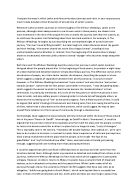Compare the ways in which Larkin and Abse talk about families
Larkin and families
Larkin’s presentation of families in the anthology The Whitsun Weddings is largely negative, as he presents children as a “dilution” of oneself, and shows marriage to be stagnation between two people. The unhappy marriage between Larkin’s parents deeply affected him, and this could arguably explain his negative attitudes towards families in general. In contrast, Abse presents family as central to his life, and presents his son as an extension of himself, which directly contrasts with Larkin's view that children lessen oneself. Abse also presents marriage with "passion" rather than "isolation". Whereas Larkin seems to question the value of family life, Abse presents the view of many that families are a counterbalance for death rather than a deprivation.
In his poem Dockery and Sons, Larkin's persona, which is similar to Larkin himself, describes Dockery's son as a "dilution", suggesting that Larkin believes children lesser your quality of life or value through diluting it. He furthers this to suggest that Dockery was arrogant to assume "he should be added to", which alludes to Larkin suggests perhaps not everyone in worthy of reproducing. From a Marxist perspective, here Larkin separates people based on his own class system, as he deems those "junior to him" as unworthy of children, even those he dislikes the idea. Again in the fifth stanza, Larkin suggests that the idea to have children is "not what we think truest or most want to do", implying that some people see 'continuing the family line' as an obligation or "habit", rather than a desire. He uses a monosyllabic simile; "those warp tight-shut, like doors" to suggest that children can literally shut the doors on your life as you knew it, but also to suggest that this arrogance and habit causes us to be unable to see other possibilities and to stop this from hardening "into all we've got". In this, Larkin implies that were people able to shed the arrogance and "innate assumptions" associated with children, then the doors could possibly open. Larkin's language here is crucial to understanding that he sees another option. Whereas earlier in the poem, "the door of where I used to live [was] locked", suggesting there is no way back, this 'door' is only "tight-shut", implying that it can be opened. The line "Life is first boredom then fear" could also arguably relate to family, as it the act of having children can come from boredom, as people wish to fill their lives but also from fear that they'll be forgot, thus 'add to themselves'.








